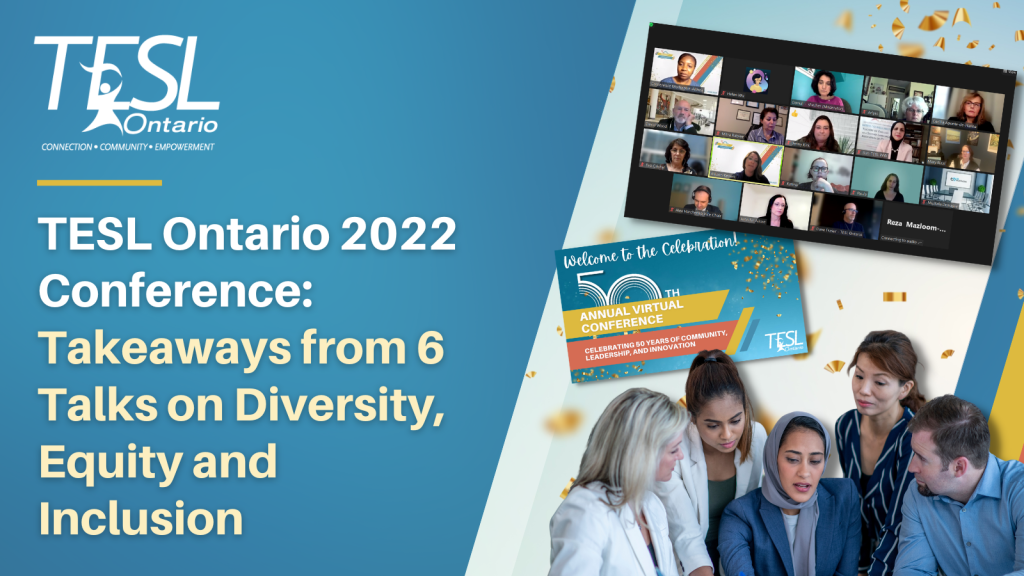TESL Ontario’s 2022 conference, which marked the organization’s 50th anniversary, brought forth current perspectives, reflections, and suggestions related to diversity, equity, and inclusion. This post highlights takeaways from six talks about fostering inclusion, advancing accessibility, and supporting newcomers.
Talks on Fostering Inclusion and Belonging
-
A Pedagogy of Belonging Includes Us All
In this keynote address, Tyson Seburn from the University of Toronto proposed four guiding principles for challenging heteronormativity and including marginalized identities in language education materials. First, he recommended that a variety of 2SLGBTQIA stories appear with frequency alongside other narratives. Second, he emphasized that narratives must be informed by authentic voices and experiences (and not guess work). Third, he encouraged teachers to represent 2SLGBTQIA folx as individuals, not a collective whole. Fourth, he stressed that representations should not cause marginalized individuals to feel the need to represent their communities, defend themselves, or be the access point for all questions. He then shared two approaches for more meaningful inclusion in English language materials. In the usualisation approach, he explained, traditionally marginalized identities are included as usual, everyday occurrences and their identifying characteristics are not the focus. In the disruption approach, instead, the status quo is problematized and explicitly linked to the lived experiences of traditionally marginalized identities. At the core of Tyson’s talk was a recognition that everyone has a role to play in identifying, including, and improving marginalized experiences within, through, and beyond English language learning contexts. Tyson invited people to engage with his work by visiting bit.ly/howtoinclusive or following him on Twitter @seburnt.
-
Promoting Equality and Inclusion in English Language Classes
In this presentation, Azadeh Pordel from Western University asked teachers to consider what unconscious bias they bring to the classroom. She encouraged critical reflection on the ways in which English language supremacy and deficit views may surface in teaching. She then offered a series of recommendations for responsive, equitable, and anti-racist pedagogy. These included viewing English language learners from an asset-based perspective, working harder to understand students’ multilingual realities, including a syllabus statement about the value of linguistic diversity, and revealing linguistic prejudice in class. Azadeh welcomed people to follow her on Twitter @AziPordel.
Talks on Advancing Accessibility Online
- Innovate your ESL Teaching with Accessibility Tools
In this session, Celina Costa from George Brown College illustrated how accessible technologies align with the Universal Design for Learning framework and the Substitution, Augmentation, Modification, and Redefinition model. She explained how teachers can differentiate and innovate their instruction by offering choice, alternatives, and variation in language learning materials and tools. Such tools may include simplified readers (e.g. Postlight), text-to-speech (e.g. Read Aloud or Natural Reader), speech-to-text (a feature available on smartphones, Microsoft Word, and Google Docs) and immersive readers (e.g. Flip, Nearpod, Merge, etc.). Celina can be found on Twitter @ceecosta.
- LINC Stakeholders – Digital Accessibility Perspectives
In this talk, John Allan from New Language Solutions outlined key digital accessibility considerations from the perspectives of instructors, students, developers, and managers. He encouraged all parties to familiarize themselves with and advocate for the use of Web Content Accessibility Guidelines, including tools and training such as Web Accessibility Initiative Easy Checks and the Accessibility for Ontarians with Disabilities Act. He stressed how these efforts can improve web access and experience for all users, while ensuring compliance with government regulations.
Talks on Supporting Newcomer Learners
- Mental Health and Anti-racism: Evolving Curricula for Newcomers
In this presentation, Pat Howell-Blackmore and Snezana Gabric from COSTI shared findings from a curriculum development project addressing themes of anti-racism and mental health. Developed for LINC learners at CLB levels 1-2, 3-4, and 5-7, the project revealed a need for a) more classroom resources related to these themes, b) increased learner awareness of how to access available supports, and c) teacher training for how to deal with issues that may arise during a class on either topic. The presenters advocated for a strengths-based approach to addressing these needs, including the development of materials that teach key topic-related vocabulary, along with opportunities to explore how to respond to and navigate interactions and systems.
- Empowering Newcomers Through Community Connections
In this talk, Gayane Petrosyan and Hind Kassem from the Centre for Skills Development illustrated how creating and cultivating community connections can empower newcomers and enhance their overall well-being and belonging in Canada. Gayane and Hind stressed how strategic collaboration between skills centres and English language programs can help newcomers to foster language skills beyond the classroom, while experiencing the social benefits of community building. The presenters encouraged instructors to refer newcomer learners to the Centre’s conversation circles (in English, French, and Ukrainian), as well as their parenting support groups and digital literacy and immigration workshops.
TESL Ontario strongly encourages conference and webinar proposals related to themes of diversity, equity, and inclusion. Please consider sharing your experiences, perspectives, and expertise in this area.
Rebecca Schmor has taught English, Spanish, and German in higher education and private language institutions in Canada, China, Cuba, and Germany. She is currently an English for Academic Purposes instructor, graduate research fellow, and PhD candidate at the University of Toronto. She serves on the Diversity, Equity, and Inclusion Committee at TESL Ontario.

